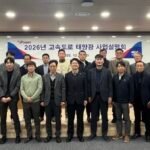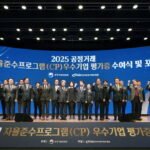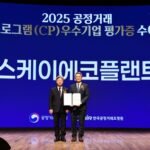Minister of Economy and Finance Choi Sang-mok (left) speaks during a meeting with Bank of Korea Governor Rhee Chang-yong at the ministry on Sept. 30, 2024 (Courtesy of Yonhap)
South Korea’s finance minister and central bank chief on Monday agreed to deal with the world’s lowest fertility rate, the most urgent task, to maintain the long-term growth momentum of Asia’s fourth-largest economy.
Minister of Economy and Finance Choi Sang-mok and Bank of Korea Governor Rhee Chang-yong discussed structural reform measures for the sustainable economy such as steps to counter weakening growth potential due to the falling birth rate and aging population, the concentration in the Seoul metropolitan area and low social mobility.
“To solve the demographic crisis, the most urgent task, we will seek opinions from the Bank of Korea and find measures together,” Choi told reporters in the ministry.
Rhee said the country needs new structural steps to cope with the declining population growth.
“We have reached a limit in leading the economy by repairing the old economic structure little by little,” Rhee said.
The average number of expected babies for a South Korean woman during her reproductive life fell to a record low of 0.72, also again the world’s lowest last year, according to the government.
That was far lower than the rate of 2.1 per woman needed for a steady population and well behind the rate of 1.24 in 2015 when concerns about issues such as the cost of housing and education were lower.
The neonatal ward at a hospital in Seoul (File photo by Yonhap)
BALANCED REGIONAL DEVELOPMENT, INFLUX OF FOREIGNERS
Rhee stressed the country needs to seek balanced regional development to solve the demographic crisis.
“It is hard to achieve the intended target with dispersed investments in regions amid the falling population in terms of investment efficiency and sustainability,” he said. “It is necessary to shift the paradigm of balanced regional development to focus on non-Seoul metropolitan areas.”
Choi, also the country’s deputy prime minister, emphasized the influx of foreigners.
“We need to actively attract global talents to enhance the competitiveness of national industries and deal with the population issues by establishing an open talent ecosystem,” Choi said.
RHEE, FIRST BOK CHIEF VISITING FINANCE MINISTRY
Rhee was the first BOK chief to visit the finance ministry. None of his predecessors made such a visit, considering the central bank’s independence from the government.
Minister of Economy and Finance Choi Sang-mok (left) shakes hands with Bank of Korea Governor Rhee Chang-yong, the country’s first central bank chief to visit the ministry on Sept. 30, 2024 (Courtesy of Yonhap)
He did not comment on monetary policy amid expectations that the BOK may lower the policy interest rate in October or November on the slowing inflation. The US Federal Reserve reduced its interest rates for the first time in more than four years with a larger-than-usual cut earlier this month.
Rhee focused more on structural problems dragging the South Korean economy instead.
He discussed with Choi various topics such as service sector development, measures to bolster economic activities for young and old people, as well as steps to support families in raising birth rates.
BOK AS THINK TANK
BOK has served as the country’s think tank since Rhee took office by proposing policies, which a single ministry cannot make, on sensitive issues such as domestic helpers from other countries and college entrance exams.
Some critics said the central bank abused its authority, but Choi rebuffed such arguments.
“BOK’s talented staff is responsible for thinking about solutions to various problems our society is facing,” Choi said. “It is highly desirable.”
Rhee expressed his views on various issues such as AI’s impact on the economy during the meeting with Choi.
“It is expected to raise productivity in the economy and contribute to the long-term growth,” he said on the digital transformation with AI.
“It will be a great opportunity but also a great risk, given the expected problems such as job replacements and increased financial market risks.”
By Se-Min Huh
semin@hankyung.com
Jongwoo Cheon edited this article.















